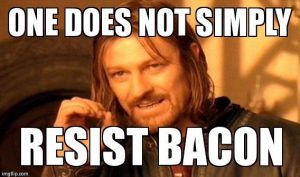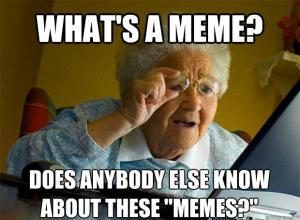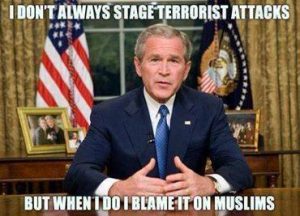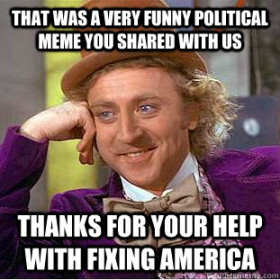LOLcats. Scumbag Steve. All Your Base Are Belong To Us. One Does Not Simply. If you have any idea of what I’m talking about, congratulations. You are fluent in “the Internet.” Actually that’s not even true. It only means you’re fluent in the 2010 dialect of the Internet.
If you don’t know what I’m talking about, or don’t know what a “meme” is, let me explain. (For the rest of you who already know what a meme is, you can skip the next few paragraphs).
A “meme” is a cultural artifact that spreads throughout a population. For example, a meme of the 1990s would be Pokémon cards. In a short amount of time, they became extremely popular, thanks to word-of-mouth, children’s natural drive to conform and, of course, marketing.
Since the rise of the Internet and, particularly, social media, however, the word “meme” has come to apply to artifacts of the Internet culture. If the Internet is a community, then memes are the running inside jokes that the community shares. They are highly derivative, self-referential, simple and designed to entertain.
Here are a few examples:
How do memes get produced? The most efficient explanation is through a comparison to the drug trade. Memes are traditionally spawned on the dark side of the Internet that is “4chan.” It’s basically the Internet’s meth lab. You don’t want to go there. There’s a lot of messed-up stuff that goes on. But every once in a while, it will produce something the general public can consume. Thus, a meme is born.
At this point the meme is picked up by sites like 9gag, Imgur, Reddit and Memebase. These are the Internet’s drug dealers when it comes to memes. They’re much more friendly and safe to use than going straight to the source. They don’t produce. They just distribute.
Where do they distribute to? Facebook. The aging social media site where your grandma is most likely to be, if she’s on the Internet at all. This is how we end up with those disastrous scenarios where during Thanksgiving dinner, Grandma asks you what “Netflix and Chill” means.
This is the meme industry. It looks different today than it did four or five years ago and will surely look vastly different another few years down the road.
Now that we’ve laid a foundation of some basic context surrounding the meme culture, we can start talking about how these seemingly innocuous cultural artifacts are slowly but surely destroying our society.
The problem began when, one day, some think-tank, political advisor or campaign manager said, “Hey, the kids sure do like those things with the pictures and the words on them. Let’s try reaching younger voters through that.” Thus, the political meme was born.
We all have that one person (usually several people) on our Facebook feeds who takes it upon themselves to share multiple political memes each and every day. Every time a controversial event happens or there’s a divisive issue in the news, all kinds of people make their opinion known by sharing political memes.
While it’s good that people are at least engaging in some form of ideological debate, the exchange of political memes is just about the worst possible way of doing so.
What’s the problem with them? First, they’re made by some random Joe-Shmoe on the Internet. While that’s fine for memes created for entertainment, the fact that people’s political ideologies are being formed by content being produced by someone with no obligation to factual accuracy is problematic.
Second, political memes thrive on over-simplifying a given topic. Serious debates and international conflicts are complicated issues that can’t be properly analyzed in one JPEG’s worth of space, but that doesn’t stop people from trying anyways.
Third, political memes often seem more interested in showing why their opponents are stupid than actually talking about any issues. Our country was built on compromises, but in our current political climate, “compromise” has almost become a dirty word. How can we expect Congress to agree on anything when we as citizens are engaging in political discourse that compares the other side to Nazis?
Let’s look at some examples.
Good example of two outright lies: the old “Obama is a secret Muslim” conspiracy, and the incorrect notion that the U.S. hasn’t done anything about ISIS.
It’s not only right-wingers who have crazy conspiracy theories.

No matter which candidate you dislike, if the only negative thing you can say about them is name calling, then your opinion is automatically invalid and you should lose the privilege to be on the Internet.
Well technically this is just a screenshot of a tweet, but it’s been shared around like it is a meme, which is sad in and of itself. But besides that, comparing a complex issue like a refugee crisis to a bowl of M&M’s is absurdly simplistic and unhelpful.
Conservatives don’t have a monopoly on the old rhetorical trick of comparing X to Y in order to prove a point about X, even though X and Y have nothing do with each other.
I get what this guy’s trying to say, but taking one picture of a recruiting center with no one outside isn’t much of a concrete argument.
The intentional pairing of a man pointing a gun at the viewer with the concept of refugees, combined with the intentionally shocking font and color is nothing less than fear-mongering and manipulation that would have made Joseph Goebbels proud.
This is just a small selection of memes found by skimming Facebook for only a few minutes. It should be noted that not all politically themed images are this terrible. There’s a long tradition of political cartoons that do a good job of making a comment on an issue in a creative way. While there are some political memes that accomplish this, they are by and large the minority.
Even better than political cartoons is actual journalism. Countless people put in a tremendous amount of effort to produce well-researched and nuanced analyses of political issues then put them online for people to read for free. If we have an uneducated electorate, it’s certainly not because we were never given the chance.
Our country’s political culture is built from the ground up. When Congress is unequivocally opposed to compromise, or when they condemn a bill for “being too long,” that is a reflection of our own divisiveness and increasingly short attention span. If we want our legislators to stop talking in sound-bytes, then maybe we should start having more serious and in-depth conversations ourselves, rather than letting the images we share on Facebook be the extent of our political activism.
@jusstadams














That Memelord • Sep 28, 2020 at 5:03 am
Hello,I know it’s a bit late but. Do you know that the meme community make the world a better place. We know that we used incorrect spelling and it’s ruining spellings. But,we have created some of good stuff. I came from the Malayisian meme community. The meme community have bringed old song like Rick Astley’s song. We have made some people famous with just a simple meme. Like from the Malaysian meme community we have “Odading mang oleh” witch is a famous meme and improved the management and we also made “Sting aku yahoo” which is from a small TV show. We hope you guys changed your mind.
~Simply Fenrawr
tom sawyer • Feb 7, 2020 at 9:02 am
memes suck They make fun of things like for example they are making fun of the kid that did not know what 9 plus 10 was and that is bad people always say never to make fun of people and memes destroy that concept.
boi • Feb 14, 2022 at 4:25 pm
whats 9 + 10?
stefan trumpus • May 3, 2023 at 11:33 am
21